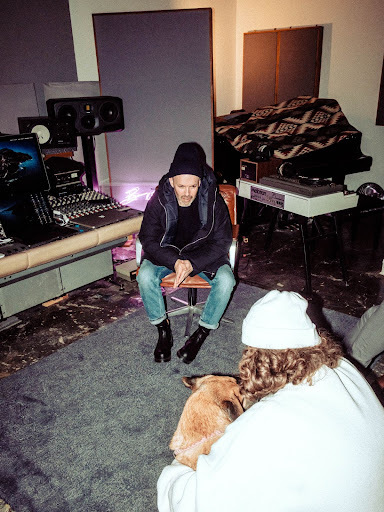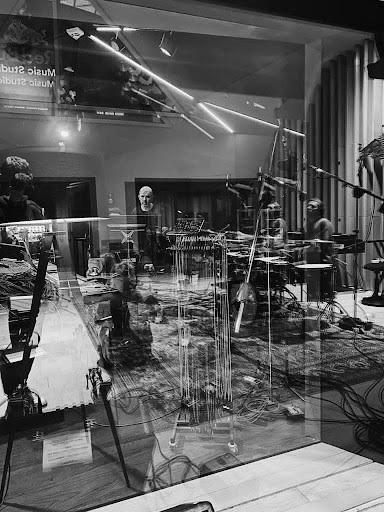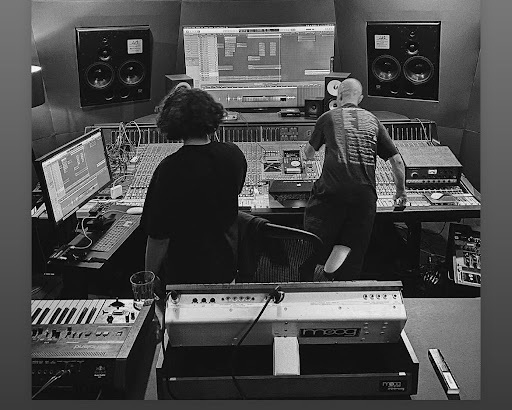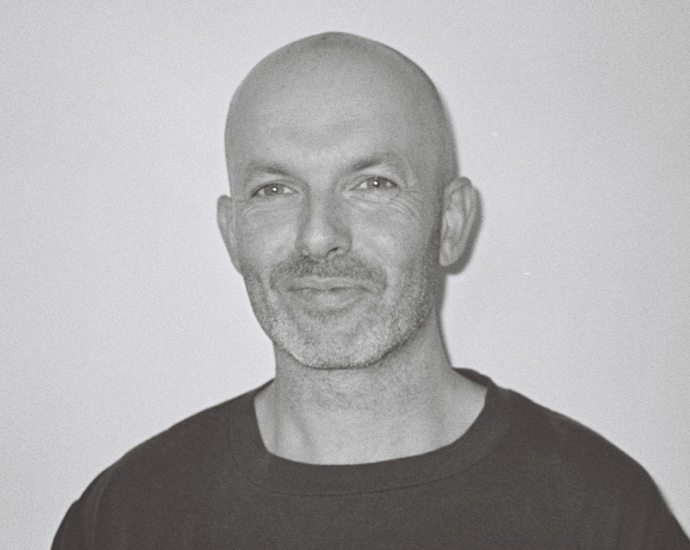Digging into the creative process, Byta speaks with artists, musicians, producers, DJs and anyone involved with music creation. A conversation about how they create, collaborate and share music. From studio setups to routines, and the first person to hear about the next 'big' work.
Where are you based?
UK Ldn and Berlin
How, when and where did you start making music? Are you primarily a musician or a producer, or do something else?
I see myself as a producer/writer, the two are so interlinked.
I released my first track when I was 17 with a friend, we had played in bands together and then he started to introduce me to studios and sampling. Before I went to University we released an EP which consisted of 4 acts from the local area.
My family has always been involved in music. My mother sang with the London Philharmonic and performed numerous times at the proms. My Great Uncle (who was a big part of my life) was taught by Alban Berg and Arnold Schoenberg who were part of The Second Viennese School and then he went on to work with Vaughan Williams. My father had an extensive record collection of Jazz and psych. We had so much Music and Literature, culture was everything growing up. Other family members were also composers and conductors.
Who would you consider some of your biggest influences when it comes to your “sound”?
I take influences from a wide range of things which for me I can hear however maybe other people can’t. I am an avid record collector and have been since I was a teenager. So I might be into buying Jazz from South Africa or 80’s highlife from Kenya, Brazilian hip hop from the 90’s. Early 80’s Dancehall from JA etc etc etc.
I am from that generation of beat makers who became producers, constructing whole songs on Mpcs or dedicated samplers so from that aspect I am influenced by Organized Noise, Qtip, Premier, J dilla, Aphex Twin, Dr Dre, King Tubby, Wailers, Neil Young.
Explain your creative process? Do you have a routine?
This somehow always come back to the same thing for me which is sampling or creating a sample that could even be in the form of utilizing a vocal memo and allowing that to blossom into another direction… It’s almost like a lineage to the composition so I often use my iPhone to record ideas in from the piano, and this mp3 i’ll use as a sample in my DAW or Mpc… with the sample / or OG recording, I’ll play with the pitch key tempo etc until i feel i have a little sound bed to compose too.
I like to work this way with lyrics and melody too. I really feel the first idea is normally the best and the most hooky. I really enjoy working with a great hook the same as I might work with a sample.
Sometimes there isn’t the advantage of time and experimentation when in group writing sessions, people want things quickly.
What is your “studio” setup?
The studio has an extensive set up is equipped with juno 60, juno 106, roland 808, Akai Mpc 2000xl, Akai s650, 1970’s Neve Console, Yamaha SK20, Roland SH101, 1210 & Loads of records, Mac Pro Logic X, Fender Mustang Bass, Fender Esquire, a Touring Grand, Ns10, Tannoy Little Reds and a number of random musical things.
I’m happy in home studios or professional ones, for me, it’s just about how creative you can get. It’s about who I have around me, it’s about how we interact in the studio or together in a writing session.
When I get the opportunity I love working on SSL G or E series…it becomes a different process of having to interact with something mechanical that doesn’t communicate through a screen though. We had one in our set up for years and I trained on an SSL at Swanyard Studios LDN (now defunct) as an assistant to Phil Brown (Talk Talk, Bob Marley,Jimi Hendrix,Led Zep etc). They are so versatile and creative you change your creative process. You’re listening and making decisions on what you’re hearing, not what you’re looking at.


Just before January I was in Redbull and Freundenhaus studios for 2-3 weeks, both SSL equipped.
What is your process when working with other people? How is collaboration different in the studio vs working remotely?
For me it is about who you are working with and how you all communicate rather than how or where you are working. For the last 1.5 years I have been working remotely with two artists in Trinidad, the process is sporadic and we use multiple studios over the island… ideas get sent back and forth from voice notes for melodies to scratch vocals and instrument parts. We all work quite closely in the creative process and it is a real interaction between us.
For writing sessions which are Zoom based, they are pretty easy going because they are so focused. We can have the basic idea of a song with a ruff prod idea in 2-3 hrs…At the moment i am writing closely with Erik Alcock if we are doing zoom sessions together then we will go into separate studios so at any point either one of us can focus directly with the artist while the other mutes their feed and can replay synths or find samples etc, this way the creative process doesn’t get stuck.
When I was working with Amy for our song on the Back to Black album, our process was really a few hours a day over 7 days for that particular song. We had the basic track in a day or two all created on the MPC and then the rest of the time was Amy just listening to the track and getting ideas. She wanted space and time with no pressure so she could find exactly what she needed to say. I spent a few days adding other parts and other vocalists after we cut her vocals. I really think if you’re working with artists, someone who has something to say because there is a need within them to communicate with people, then you need to let that creative process grow naturally.
Music needs to be made for the need to express…
Rollo (Dido’s Brother) was always “publish and be damned” do your thing and stand by it.
At what point(s) are you comfortable letting other people hear what you are working on?
That is quite a difficult process, for me I need to be happy with the track before I play it. I try not to get too bogged down with others’ points of view unless they are involved with the creative process (artists, writers,musicians, A&Rs) or I trust them. If we are in the creative process together then I’ll send plenty of little ideas back and forth as the composition grows. If it’s for people outside then it’s close to being mastered. So many people are obsessed with playing tracks and getting feedback mainly because they are unsure of themselves as creatives. It’s about being happy with what you do and trying not to watch other peoples feedback or progress. However everytime I listen to one of my tracks after it’s released I think “damm could have done better”.
Do you share your work in progress (streams or downloads)? Any technical frustrations?
If it’s mixed and mastered then it’s streamed, I rarely send round mp3s/wavs to people unless they are really needed.
However, I’m sending parts back and forth constantly to other producers who I work with and artists to cut vocals or add guitars… Normally I won’t send the whole track as individual stems, i’ll make a particular bounce for whoever i’m working with, maybe they’ll get two stems one being drums and bass grouped together and then another with just samples… I’m really happy to work with other people with their creative process too – I am open to get parts back, sometimes the track which has been changed perhaps in tempo or key, or even arrangement. It’s just about pushing the creative process, being open to change and getting the best out of the composition and yourself.
How do you know when a track/album is finished?
This for me is always a few steps back… when everything is in my DAW and I’m happy with the parts (even though things may well change) in terms of arrangement etc, I will bounce all the individual instruments, vocals etc and start a new arrangement – so my session is running with all signal channels bounced. Doing this enables me to move on in terms of production, and mentally takes it out of the demo phase. DAW processing is amazing however you can get stuck in an endless cycle of tweeking and adding more plugs etc and not moving forward with the prod/composition. So bouncing enables me to do this.
Honestly you know when the track is finished when you’re tired of listening to it and are happy to move on, that’s more of a feeling then anything quantifiable.
How do you listen to the final mixes/mastered work?
I check everything back on my studio setup. But also on my iPhone and laptop speakers… It’s easy to listen to a mix on a massive set of speakers which sound great and think this sounds amazing. You need to be checking back on poor quality playback.. if it sounds good on these things it will sound great anywhere.
How important is pre-release security when sharing new work?
It’s important, that’s why I’m not sharing WAV masters or MP3 files, everything is streamable only. If you’re sending parts to a label for a mix then nothing gets sent unless there is a contract in place. I’ve sent parts off to labels thinking that we have an agreement and then that’s it, at that point once you’ve let go of your parts your control has ended. And if you haven’t been paid or don’t have anything legal in place about your points/ownership then it can be a problem. Don’t send out Masters for release without something in place from who-ever is releasing it.
Who on your team gets to hear the final versions first and why, what formats do they each need?
There are a number of people I really trust, and they all are different creatives. Erik Alcock (Eminem, P!NK, Kanye West, French Montana, Nas, Céline Dion) is an amazing songwriter, he is more of a classical pop writer, his sensibility about songs being translatable is invaluable, Yannick Earnst (who I signed to my company at Universal) is one of the most talented people I’ve ever met, he has really good taste in music and his ears are 100% honest. Zino is a mastering engineer. He is great from a mathematical sense of frequencies and levels, it’s just facts. Vera Bohl who is a manager and creative. She is really honest and sometimes that’s what you need and has an amazing overall sense of what’s right. And Franz Job, my bro in T&T is one of the best vocalists I’ve ever met.
Outside of your inner circle who are the people that will need to hear the new tracks next?
Label, management, publisher
Anything you are working on, anyone you are working with and want to share?
Erik Alcock, myself along with a Canadian writer Liz Rodrigues (Celine Dion) have been working on a high profile project for a while, we are just taking a break from it atm.
In the run up to winter, an EP is being released featuring two rappers from Trinidad. They are both amazing talents and really close friends. We’ve been recording together steadily over the last few years between London, Trini and Berlin and at last we are starting to see some of the material come out.


